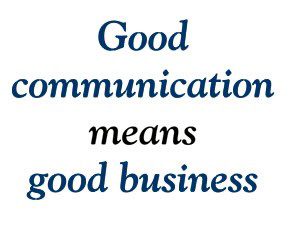I am fortunate to work for a company that has been in business for over 27 years. In the professional services industry, that is an eternity. We have had lots of success selling products and services to new clients, but what has really sustained us for that long are the relationships we have built with our clients and associates. That is, to become partners over many years, and in many cases, many different systems. There are lot of reasons for this, but I believe that they key element is communication.
 I had a colleague that used to joke ‘If there is a communication problem, I haven’t heard about it’. While amusing, it also hints at something that is true in our industry, as well as most others: If you aren’t talking to your customers, chances are your competitors are.
I had a colleague that used to joke ‘If there is a communication problem, I haven’t heard about it’. While amusing, it also hints at something that is true in our industry, as well as most others: If you aren’t talking to your customers, chances are your competitors are.
Many firms have policies of repetitive ‘check-ins’ and follow-ups with clients to maintain relationships or communicate statuses. While the concept is good, it is the way it is implemented that differentiates. There are a few quotes that I like to reference:
‘The most important thing in communication is hearing what isn’t said.’ – Peter Drucker
‘The single biggest problem with communication is the illusion that it has taken place.’ – George Bernard Shaw
‘The biggest communication problem is that we do not listen to understand – we listen to reply.’ – Anonymous
‘Your customer doesn’t care how much you know until they know how much you care.’ – Damon Richards
What these quotations have in common is that effective communication is more than just sending an email or text every so often to check a box on a schedule. It is about really taking the time to listen to what the other party has to say – to really take the time to understand their issues and concerns.
This strategy should be used for internal resources as well. To retain the best talent (or to know when the best decision is to move on), a manager needs to openly communicate with his/her team. That means not just passing information down, but also soliciting input from them. Managers should provide an environment where team members feel encouraged to discuss things openly. Surveys show that while most managers (66%) believe they have an effective communications policy, that number drops significantly the farther down the chain you look. As a manager, don’t presume because you think you communicate well that your team members concur.  Effective communication is a two-way street.
Effective communication is a two-way street.
The bottom line is this – in today’s technology-driven world, the greatest technology tools cannot replace taking the time to call and visit your clients and meet 1-on-1 with team members. Really listen to what they have to say – take the time to hear them and understand their issues. You will be pleased at the relationships that develop.


